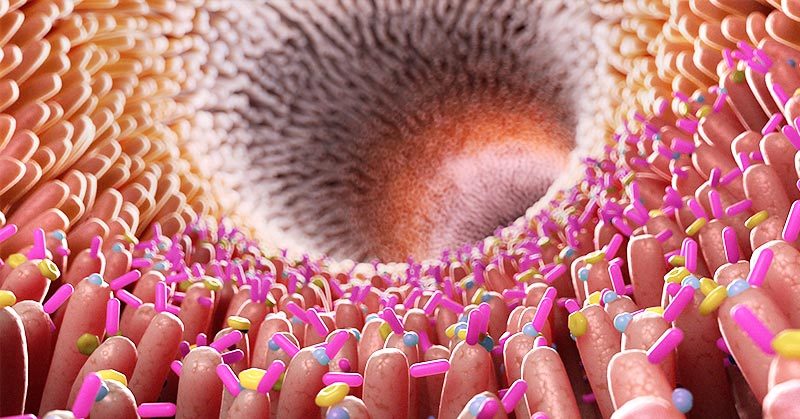The gut microbiome is made up of hundreds of thousands of microorganisms, bacteria, viruses, protozoa, and fungi. It plays an important role in nutrient and mineral absorption, the synthesis of vitamins, enzymes, and amino acids, and the production of short-chain fatty acids [1].
Thanks to recent technological advancements, researchers are now able to learn a tremendous amount about the human microbiome. Not only are they gaining more knowledge about the structure and makeup of the gut microbiome, but scientists are beginning to draw links between our gut bacteria and various diseases [2].
A recent genome analysis has linked microorganisms in the human digestive tract to 29 specific health conditions.
Read: Meet the Women Who Tackled Her MS with Food and Lifestyle Choices
Gut Bacteria and Disease: The Study
Previous studies have suggested a link between gut bacteria and disease, however, none have been quite as in-depth as this one.
Researchers performed a genome analysis on more than four hundred thousand people, and found proof that the gut microbiome was linked to several health conditions like chronic obstructive pulmonary disease (COPD), high blood pressure, and type 2 diabetes.
Hilde E. Groot, MD, of the University of Groningen in the Netherlands said that previous to this, the extent to which the human microbiome could be a determinant of disease was largely unknown [3].
The researchers found 422,417 unrelated adults for the study. They all came from White British Ancestry with genotype and matching genetic data. The average age was 57 years old, and 46 percent of the participants were men.
To figure out which diseases were linked to the gut microbiome, the team conducted a phenomewide association study. It included 35 distinct single-nucleotide polymorphisms (SNPs) that are known to influence the microbiome of the human gut.
SNPs are the most common type of genetic variation among people. Nucleotides are the building blocks of DNA, and each SNP represents a single nucleotide. Each individual has roughly four to five thousand SNPs in their genome. SNPs can be unique, or they can occur in many individuals.
SNPs can act as biological markers, and help scientists locate genes that are associated with disease [4].
The Study Results?
In this study, the researchers identified seven SNPs that were significantly associated with 29 disease outcomes.
While there has been a significant increase in the amount of research concerning the gut microbiome and disease. However, most of those studies only looked at one or a few traits.
“The strength of our study is the possibility to cover a wide range of traits simultaneously within one population,” Groot said [3].
Earlier studies have already hypothesized that the human microbiome is a complex system, involved in many pathophysiological mechanisms in the body. This new study supports that theory.
What Does This Mean?
More research is needed, but the information from this study could lead to better treatments or preventative strategies. Ideally, this will help to mitigate the risk of disease in the future.
“Microbiota and their metabolites might be of importance in the interplay between overlapping pathophysiological processes, and could serve as potential therapeutic targets for the maintenance of health and prevention and treatment of cardiovascular diseases,” said Groot [3].
She was quick to point out, however, that it is still too soon to give patients advice concerning their microbiome. She is hoping that genetic studies like theirs will help other researchers understand the link between gut bacteria and disease.
Carol Ann Remme, MD, of the Amsterdam University Medical Center, said that previous studies had found a possible link between the gut microbiome and several chronic conditions like cardiovascular disease and type 2 diabetes. She pointed out that it is difficult to study the effect of gut microbiome composition in large patient groups.
“As an alternative approach, the study authors showed in a very large population that genetic variants previously shown to influence gut microbiome composition were significantly associated with conditions such as hypertension, type 2 diabetes, hypercholesterolemia, and heart failure,” she said [3].
Research is showing that an individual’s gut microbiome composition is defined by both genetic and environmental factors like diet. This can affect a person’s susceptibility to certain diseases, and also change disease outcome and progression.
Dr. Remme believes that this research will eventually result in doctors creating personalized treatment or prevention strategies for individuals, in which they target their gut microbiome composition.
“I expect this area of research will become increasingly important in the coming years.” [3]
Keep Reading: Resistant Starches, Good Bacteria, and Colon Cancer—What You Need to Know
- https://www.sciencedirect.com/topics/medicine-and-dentistry/gut-microbiome#:~:text=The%20gut%20microbiome%2C%20as%20defined,the%20gastrointestinal%20tract%20(GIT).
- https://www.ncbi.nlm.nih.gov/pmc/articles/PMC4290017/
- https://www.medscape.com/viewarticle/936649
- https://ghr.nlm.nih.gov/primer/genomicresearch/snp

